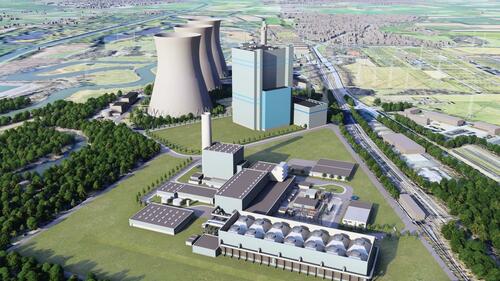RWE plans hydrogen-ready combined-cycle gas turbine at Gersteinwerk in Werne, Germany
Essen – RWE is planning to build hydrogen-ready gas-fired power plants at the company's power plant sites in Germany to contribute to a successful coal phase-out by 2030. Following Weisweiler in the Rhenish mining area, the company is now pressing ahead with plans for such a plant at a possible second site in Werne in the southern Münsterland region. An H2-ready combined-cycle gas turbine (CCGT) power plant with a nominal capacity of around 800 megawatts may be built at the Gersteinwerk power plant.
Following intensive technical soundings, RWE has commissioned an Italian-Spanish consortium to plan the project. Work on the planning approval process is already underway.
Nikolaus Valerius, CEO RWE Generation SE: "With the approval planning for a hydrogen-ready gas-fired power plant at the Gersteinwerk, we are taking proactive measures to keep the chance of completion by 2030 open. With the construction of the new power plant, we are ready to contribute to green security of supply and thus secure the coal phase-out by 2030. This requires policymakers to quickly make some key decisions. We can only make a final investment decision once the connection of the site to a hydrogen network has been secured and the framework conditions allow for a commercially viable operation of the power plants."
The German government has announced that its power plant strategy will soon create a regulatory framework for tendering hydrogen-ready gas-fired power plants. RWE intends to participate in these tenders. According to the recently presented plans for the construction of a hydrogen infrastructure in Germany, the Gerstein plant in Werne could be located close to a hydrogen transport pipeline in the future.
A consortium consisting of Ansaldo Energia (Italy) and Tecnicas Reunidas (Spain) has won RWE's tender for the hydrogen-ready CCGT. The contract signed by the three partners includes approval planning for the power plant as a first step.
Work on the planning process is already underway. This is the prerequisite for RWE to be able to start implementing the project as soon as an investment decision has been made.
According to current planning, the plant in Werne could start producing electricity by 2030.
At the time of commissioning, the plant should be able to use a fuel mix with at least 50 per cent hydrogen content, and it is intended to run it entirely on hydrogen at a later stage.
Categories
Chemical substances
Countries
Companies
Latest news
MSSA doubles production capacity for sodium methylate in La Rochelle, France
The strategic investment will double MSSA's annual production capacity for sodium methylate from 20,000 tonnes to 40,000 tonnes, reinforcing the company's commitment to meeting the growing demand f...
Dreexo Energy to Launch Circular Economy Plant in Cádiz, Advancing Sustainable Industry in Andalucía
Construction of a new facility in the Cádiz Free Trade Zone. The project is expected to break ground in early 2026 and be operational by year’s end.
BASF invests in new semiconductor-grade sulfuric acid plant in Ludwigshafen, Germany
BASF SE, Ludwigshafen →Essential ultra-pure chemical enabling advanced semiconductor manufacturing processes New capacity meets growing demand for the manufacturing of chips in Europe
Vioneo appoints Wood to design world’s first industrial scale fossil-free plastics facility in Antwerp, Belgium
Port Of Antwerp →the renewably powered and energy efficient plant will be the first facility in the world capable of achieving the production of fossil-free plastics using green methanol at an industrial scale.

